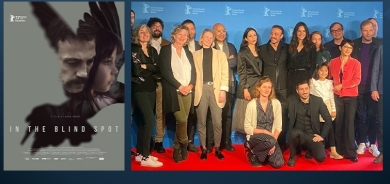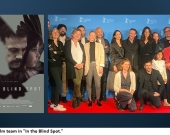Oscar Picks!

For those who wring their hands when thinking Oscars, remember two years ago, when “The Tree of Life” was among the nine Best Picture nominees, and its demiurgic creator, Terrence Malick, was up for Best Director alongside Martin Scorsese, whose gleaming cinephilic fantasy “Hugo” was also one of the nine contenders. The fact that Michel Hazanavicius and his historical glitch, “The Artist,” won in both categories instead, along with his high-gloss star Jean Dujardin, for Best Actor, is regrettable. The fact of being nominated is one for the books, but it’s the winners who are remembered—even derisively.
Last year brought one of the most woeful crops of nominees in recent memory, despite Hollywood having offered, in the course of 2012, several movies—including “Moonrise Kingdom,” “The Master,” and two of the key works in Matthew McConaughey’s resurgence, “Magic Mike” and “Bernie”—that ought to have garnered nominations.
This year’s crop offers a relatively substantial batch of movies—one enduringly great film (“The Wolf of Wall Street”), a few excellent movies, such as “12 Years a Slave” and “Nebraska,” and some idiosyncratic ones (“Her,” “American Hustle,” and “Gravity”). Yet it’s hard to find some overriding significance in the apparent waxing and waning of aesthetic sophistication in the year-by-year fluctuations of the nominating process—unless it’s in the very composition of the Academy itself.
It’s a commonplace that the Oscars reflect not the state of the industry, certainly not that of the art, but, rather, the way that Hollywood’s notables want the industry to be seen. But the composition of the body of notables that doles out the awards is changing. That may be due, in part, to a 2012 study of the Academy membership by the Los Angeles Times, whose reporters John Horn, Nicole Sperling, and Doug Smith discovered much about that body despite the fact that “the roster of all 5,765 voting members of the Academy of Motion Picture Arts and Sciences is a closely guarded secret.” Most notably:
Oscar voters are nearly 94% Caucasian and 77% male, The Times found. Blacks are about 2% of the academy, and Latinos are less than 2%.
Oscar voters have a median age of 62, the study showed. People younger than 50 constitute just 14% of the membership.
In 2013, the Academy added an unusually large number of new members (two hundred and seventy-six), with a median age of fifty-one. Far be it from me to suggest that the biological age of the membership is an issue—some of the most youthful artists around, like my colleague Roger Angell or the director Alain Resnais, claim to be over ninety. But activity is a fair question: membership in the Academy is for life, and there are doubtless many members who are no longer involved in the movie business in any significant way but who, nonetheless, are voting.
When the Academy was founded in 1927, it had thirty-six members—and likely no retirees from an industry that was younger than many of its luminaries. Yet that very year saw the release of the first talking picture, “The Jazz Singer” (which got a special prize at the first Academy Award ceremony), and with the coming of sound came Hollywood’s first significant—and involuntary—retirement program. So you could say that the very first awards, all of which went to silent films (or, rather, non-talking pictures—some had music and effects), were born at the same time as movie nostalgia, as the sudden arrival of a new era from the standpoint of which to say that things were better before.
If the Academy really wanted its awards to reflect the public self-image of the industry, it could limit voting to members who are still working in the business. But it’s not an organization that seems open to drastic change, any more than Hollywood overall or most big organizations are, except in times of emergency. The paradox is how, in the movies, the sky is always falling. Every movie is a crapshoot, the chance of catastrophe is always imminent, the sense of crisis is permanent, a state of affairs that makes the illusion of normalcy at the Oscars all the more urgent.
Best Picture
The greatness of “The Wolf of Wall Street” hits too close to home, both in its unrestrained celebration of hedonism and its connection between the sales pitch and cinematic showmanship. Yes, it shows the moral and physical price of that hedonism, but it also shows how much fun decadent fun can be (otherwise, who’d bother?), and this attitude, in a place where such fun gets a lot of attention, is best kept quiet. “American Hustle” is the decent alternative: everyone’s nice, nobody craves more than what he can stuff into his pockets, and the fantasies don’t stray too far from suburban proprieties. And “Her” responds to every parent’s kvetch that their children are spending too much time gazing into their phones. It, too, is a nice movie, in the worst sense—it’s not shocking enough and doesn’t have the audacity of its conceit (start with the phone on vibrate, extrapolate from there). “12 Years a Slave” is more or less an undirected movie, and that’s all to the good. It’s an impressive literary investigation (to borrow from the subtitle of “The Gulag Archipelago”), and, even if it’s no experiment, it’s a revelation—albeit one that Hollywood is gladly associated with. I think it will win.
Best Director
That “The Wolf of Wall Street” is an exquisitely made movie, with its breezily intricate layering of time, memory, and fantasy, and its spontaneously explosive yet nuanced performances (and don’t discount Martin Scorsese’s role in coaxing those performances into existence and filming them with a visual perfect pitch), will be beside the point. Steve McQueen’s direction has the great merit—and I say this without irony—of not getting in the way (as it did in his previous films), but I think that Alfonso Cuarón’s “Gravity” trickery will prevail.
Best Actor
Five terrific candidates, but—is this getting monotonous?—Leonardo DiCaprio gives a performance in “The Wolf of Wall Street” that will deservedly endure in the history of cinema, and this fact bears no relation to his Oscar chances. It’s Matthew McConaughey’s time, even though he gives a better performance in his brief supporting role in you-know-what. Also, I’m surprised that more hasn’t been made, in this awards season, of the question of whether the real-life Ron Woodroof, whose story is told in “Dallas Buyers Club,” may have been no homophobe but, rather, bisexual. It would, after all, make a difference in the movie and the performance.
Best Actress
I thought that Cate Blanchett was a lock before the recently renewed accusations against Woody Allen. I still think that she’ll win, because the competition this year is mild. As a performance, it’s one that’s unconvincing in its hectic extremes (as if Blanchett had to figure out the gestures that made the character make sense) but utterly chilling in its quiet moments. The right candidate would have been Adèle Exarchopoulos, for “Blue Is the Warmest Color,” and its ineligibility for Best Foreign Language Film wouldn’t have disqualified her.
Best Supporting Actor
Once more, with feeling: Jonah Hill is head-and-shoulders above the competition—he obviously made much of his role up as he went along, and deserves an Oscar for the invented country “Slotvia” alone. Jared Leto’s performance is virtuosic and sentimental, but I think that Barkhad Abdi will win. As a performance by a first-time actor, it’s impressive, but I’m troubled by his director Paul Greengrass’s very notion of casting an amateur, however inspired, to play a citizen of an underindustrialized country alongside Tom Hanks’s American. It’s as if Greengrass wanted an actor who would both signify authenticity and convey it by his relative lack of technical prowess. Nonetheless, Abdi is poised and charismatic—he expresses thought and energy in immobility—and, though he’s limited by the narrow spectrum of this movie’s action, he has, justly, launched a career. It’s all the more gratifying to note that he is currently directing a movie.
Best Supporting Actress
June Squibb’s performance in “Nebraska” extracts a remarkable depth of thought from a handful of scenes. Lupita Nyong’o’s work in “12 Years a Slave” is fine, but it’s the writing that makes the characters; Alfre Woodard’s work in the same movie is more distinctive, but it’s a very brief appearance. My pick from the entire year’s crop is Margot Robbie, from, yes, from there. Jennifer Lawrence, playing with brash energy and an almost preternatural confidence, will win.
Best Animated Feature Film
“Frozen.”
Best Foreign-Language Film
The Academy makes the annual and long-standing mistake of basing its selections solely on the nominations, one per country, of an official committee from each country. It’s downright immoral to defer to choices made by government-controlled boards in repressive places. Many of the best Chinese and Iranian films, for example, are made by dissident filmmakers whose work would have no chance of nomination. The Academy should take control of the situation and put together its own commission to select foreign-film nominees released in the course of the year. The one exceptional film in this year’s quintet is Rithy Panh’s “The Missing Picture,” his documentary memoir—by way of miniature figurines and archival footage—of the destruction of his family at the hands of the Khmer Rouge in the nineteen-seventies. “The Great Beauty” isn’t, but it will win, though I was close to picking “Omar” as the surprise victor, because, politics aside, it’s a tightly realistic spy thriller.
Best Original Screenplay
“American Hustle,” which has more words than the competition, will win. “Nebraska” is the best of the five films nominated here, but its screenplay isn’t what stands out. I love it, but not mainly for its writing. At its best, it’s almost a silent film. Yes, I know that screenplays are more than just dialogue, but I’d have voted for “Blue Jasmine” on the basis of a couple of plot twists alone.
Best Adapted Screenplay
Again, my choice would have been “Wolf”—the exuberance and improvisational wonder are matched by its velvet-glove subtlety—but the script of “12 Years a Slave” has authentic literary power and I think that it will win.
Best Costume Design
On the quantity-over-quality criterion, “The Great Gatsby” will win. I laughed with, not at, the period polyester of “American Hustle”—it would have been my pick.
Best Original Song
The poperatic Broadway bombast of “Let It Go,” from “Frozen”: “No right, no wrong, no rules for me.” (Perhaps “Frozen” should be called “The LET-GO Movie.”)
Best Original Score
William Butler and Owen Pallett’s electro-bubbles for “Her.” It needed them.
Best Documentary
“20 Feet from Stardom” will win because, in propelling… unsung…heroes of entertainment to the foreground, it’s the story and the dream of an overwhelming majority of Academy members. I’d have voted for “The Act of Killing,” which, despite reservations about the director Joshua Oppenheimer’s offscreen presence (it is, inescapably, about him, too), happens to be immensely complex and troubling (even if not all of the complexity seems worked-through and not all the trouble seems accounted for).
Best Makeup and Hairstyling
I’m surprised that “American Hustle” wasn’t nominated in this category, too. “Dallas Buyers Club” will win.
Best Production Design
I didn’t think much of “Her,” but it’s the one film here that gets most of its kick from the design. I’d have voted for it, and I believe that the Academy will pick it, too.
Best Film Editing
Paul Greengrass’s directorial style, with its kinetic camera work, demands lots of stitching together. This time, David O. Russell, changing things around while the camera was rolling, also benefited from a sharp scalpel—but “Captain Phillips” will be the pick.
Best Cinematography
Hollywood’s best cinematography was done by Emmanuel Lubezki—not in “Gravity,” the film for which he was nominated, but in Terrence Malick’s “To the Wonder.” He’ll get the award because of technical wizardry, but Phedon Papamichael’s widescreen black-and-white compositions in “Nebraska” would have gotten my vote.
Best Sound Editing
Here’s an explanation, from Gregg Goldstein at Studio System News: “Using a culinary analogy, [Academy of Motion Picture Arts and Sciences Sound Branch Governor Curt] Behlmer says the sound editor identifies and picks out (or creates from scratch) a film’s sonic ingredients while the sound mixer is the chef who uses those ingredients in cooking the dish.” I’m betting on “Captain Phillips,” for the creation of combat-type sounds.
Best Sound Mixing
“Gravity,” for its creation of a seeming world of sound where there is none.
Best Visual Effects
“Gravity,” of course.
Best Documentary Short Film
This year, in the short-film categories, I’m flying blind: I’ve seen only trailers. The emotional tone of “Facing Fear,” about the reconciliation of a gay-basher and his victim, seems eminently Oscarizable, even though the journalism of “Karama Has No Walls,” about protests in Yemen, looks admirable. Alice Herz-Sommer, the subject of “The Lady in Number 6: Music Saved My Life,” died on Sunday at the age of a hundred and ten. (My colleague Alex Ross wrote about her on this site last year.)
Best Short Animated Film
The bits-and-pieces-based “Mr. Hublot” appears impressive but cold; the drawn images of “Possessions,” virtuosic but noisy. “Room on the Broom” looks like ready-made kid stuff; I think that it will win.
Best Live-Action Short Film
“Helium” is soft soap, from Denmark, about a plot to humor an ailing child. I think that it will win.
The New Yorker















